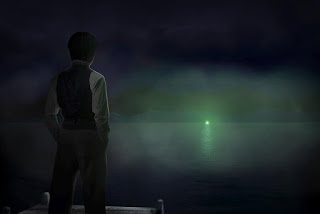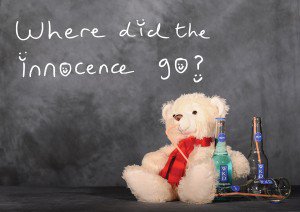While I was reading The Great Gatsby over break, I noticed something very ironic with Mr. Gatsby.
Jay Gatsby is portrayed as incredibly wealthy, living in a "factual imitation of Hotel de Ville in Normandy"(9) with a marble swimming pool. He has so much money and owns so many things. Yet despite all this, he desires the green light. Nick's first encounter with Mr. Gatsby is during a late night in which Gatsby is standing at the edge of his dock with his arms stretched out "toward the water in a curious way" (25). Later in chapters four and five we come to realize that the green light belongs to Daisy's house and of the past relationship Mr. Gatsby and Daisy had together. We assume Jay Gatsby lives a relaxing and easy life, filled with partying and fun adventures. This isn't the case when Jay first reunites with Daisy in Nick's house though, for he becomes very nervous and loses his usual calmness. Judging from the way Jay reacts to his encounter with Daisy, it is obvious that he really does want to be back with her again, to have it be just like five years ago . This ultimately shows that even though someone could have everything he/she needs, something else is always desired.
Sunday, November 27, 2016
Sunday, November 20, 2016
The Privilege of Innocence
 I've noticed that a reoccurring theme The Bluest Eye by Toni Morrison has been innocence. In their innocence, children shouldn't have a care in the world. Everyday should be filled with fun and games. For many characters in The Bluest Eye though, this wasn't the case. Many of them lost their innocence at a young age, changing their perceptions and beliefs for the rest of their lives.
I've noticed that a reoccurring theme The Bluest Eye by Toni Morrison has been innocence. In their innocence, children shouldn't have a care in the world. Everyday should be filled with fun and games. For many characters in The Bluest Eye though, this wasn't the case. Many of them lost their innocence at a young age, changing their perceptions and beliefs for the rest of their lives.Pauline loses her innocence when she marries Cholly Breedlove. Once she marries Cholly, her life becomes a sorrowful one. Without Cholly to provide a steady income, she has to work very hard to provide for her family. Her loneliness also causes her to become addicted to movies, which in turn starts her obsession of beauty. She later becomes addicted with being the perfect servant for the Fishers. Influenced by a wealthy white family, she begins to perceive everything as her own, such as the Fishers kitchen and their food. We see that she has trapped herself in her own fantasy, just like Pecola has.
Speaking of Pecola, she is probably the most traumatic loss of innocence. She loses her innocence when she gets raped by Cholly. The incident scars Pecola, seen by the "rigidness of her shocked body" and "the stunned silence in her throat" (162). Once this happens again, Pecola has completely gone insane. Another instance is when Junior takes Pecola to his house. After a short fight, Geraldine comes in and curses Pecola out. All of her tragedies chip away at her innocence and end up taking her mind.
Childhood is supposed to be a happy and blissful time, but when it's not, things get out of hand quick.
Sunday, November 13, 2016
The Influence of Media
 For the majority of her life, Pauline in The Bluest Eye by Toni Morrison is heavily influenced by the media. Pauline creates many narratives to portray her life, but the problem with her narratives is that the meanings she derives from them negatively impact her. All of her pain and suffering could have been avoided if she just realized that Cholly would never be the "Stranger" from her stories. Even her experience with with Fishers causes harm, and not only to herself. By regarding her own experiences as more meaningful then with her own family, Pauline also hurts her children. This is the reason why Pecola and her brother don't receive any love from Pauline, making their relationship very brittle. In fact, this is probably why Pecola calls her mother Mrs Breedlove.
For the majority of her life, Pauline in The Bluest Eye by Toni Morrison is heavily influenced by the media. Pauline creates many narratives to portray her life, but the problem with her narratives is that the meanings she derives from them negatively impact her. All of her pain and suffering could have been avoided if she just realized that Cholly would never be the "Stranger" from her stories. Even her experience with with Fishers causes harm, and not only to herself. By regarding her own experiences as more meaningful then with her own family, Pauline also hurts her children. This is the reason why Pecola and her brother don't receive any love from Pauline, making their relationship very brittle. In fact, this is probably why Pecola calls her mother Mrs Breedlove.Perhaps the most damaging is her addiction to movies. By watching movies, she begins to "regard love as possessive mating, and romance as the goal of the spirit" (Morrison 122). She comes to believe that love is no loner about "lust and caring for" but rather possession and beauty. The narrator even describes love and beauty to be the "most destructive ideas in the history of human thought"(Morrison 122). After watching the movies for some time, Pauline begins to rank people on a scale of beauty. She goes from disregarding physical beauty to embracing it, which shows how much the media has affected her.
Sunday, November 6, 2016
Meringue Pie
When I first saw the nickname Claudia and Frieda came up with for Maureen Peal, I wondered, "Is there another reason for the nickname other than the similarities between the spelling?" Sure enough, after searching it up on Google images, I came across a small, white, and cute picture of the pie:
Does this description ring a bell? Well it should, because that is exactly how Toni Morrison portrays Maureen Peal in The Bluest Eye. Maureen Peel is described in the book as a "disrupter of seasons", and "a high-yellow dream child with long brown hair braided into two lynch ropes that hung down her back"(62). This passage suggests the oppression of blacks, as supported by Maureen's skin color and social status. Also, the "two lynch ropes" also stimulate racial oppression. Even though Maureen is portrayed as a "dream" child, the connotation of her descriptions hold the darker meaning of what her family really is. Her introduction hints that her family's success is directly related to the oppression of the poor and colored.
No matter how hard Claudia and Frieda try to "restore their equilibrium", their attempts at classifying Maureen as someone equal to them will never work. This is simply because of their differences in color and class status. Everyone else looks at Maureen as a perfect role model, and nothing can be done to change that.
I'm kinda hungry now, I guess this is the burden Shankar has to endure while writing his blog posts :P
Subscribe to:
Posts (Atom)





